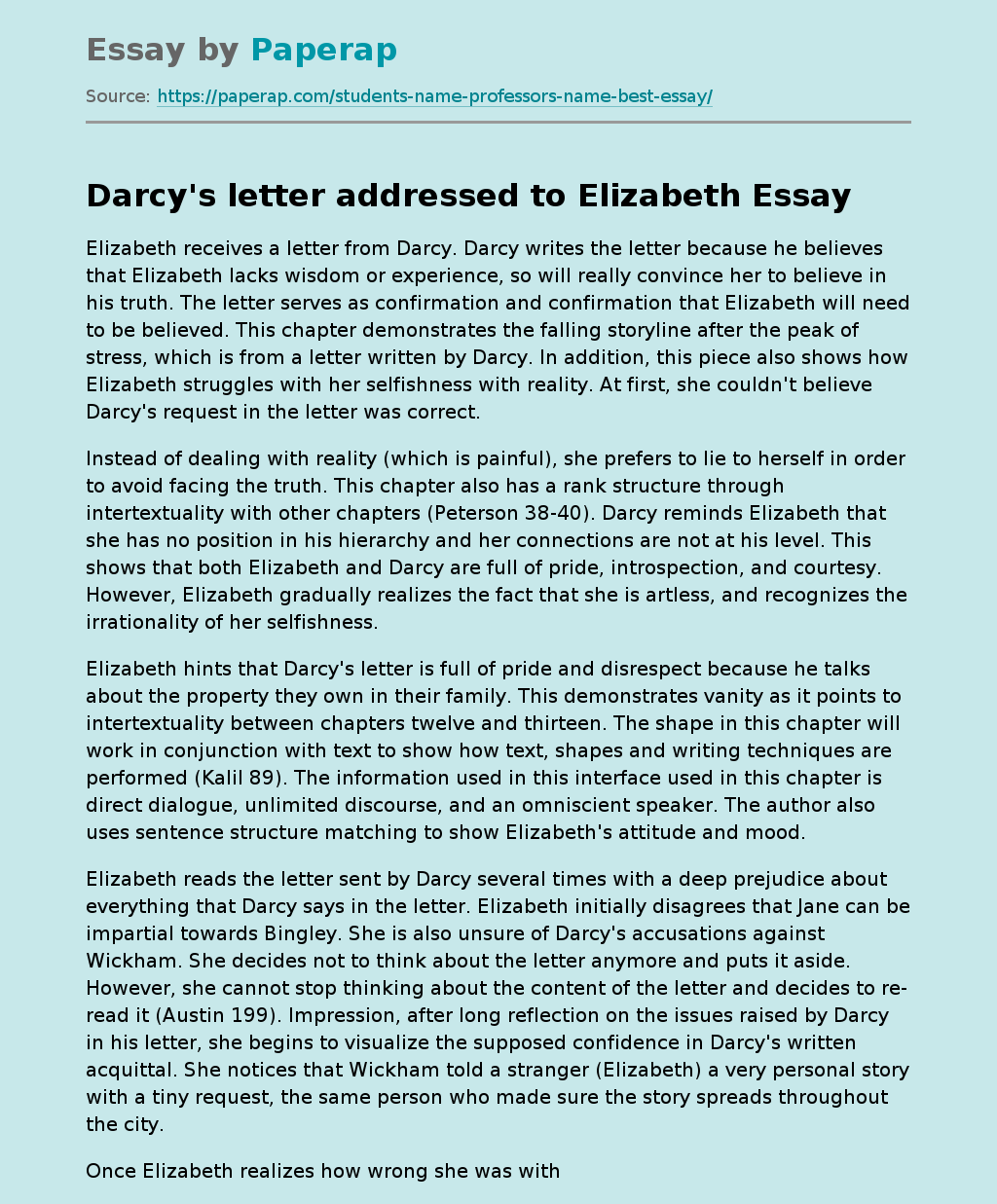Darcy's letter addressed to Elizabeth
Elizabeth receives a letter from Darcy. Darcy writes the letter because he believes that Elizabeth lacks wisdom or experience, so will really convince her to believe in his truth. The letter serves as confirmation and confirmation that Elizabeth will need to be believed. This chapter demonstrates the falling storyline after the peak of stress, which is from a letter written by Darcy. In addition, this piece also shows how Elizabeth struggles with her selfishness with reality. At first, she couldn’t believe Darcy’s request in the letter was correct.
Instead of dealing with reality (which is painful), she prefers to lie to herself in order to avoid facing the truth. This chapter also has a rank structure through intertextuality with other chapters (Peterson 38-40). Darcy reminds Elizabeth that she has no position in his hierarchy and her connections are not at his level. This shows that both Elizabeth and Darcy are full of pride, introspection, and courtesy. However, Elizabeth gradually realizes the fact that she is artless, and recognizes the irrationality of her selfishness.
Elizabeth hints that Darcy’s letter is full of pride and disrespect because he talks about the property they own in their family. This demonstrates vanity as it points to intertextuality between chapters twelve and thirteen. The shape in this chapter will work in conjunction with text to show how text, shapes and writing techniques are performed (Kalil 89). The information used in this interface used in this chapter is direct dialogue, unlimited discourse, and an omniscient speaker.
The author also uses sentence structure matching to show Elizabeth’s attitude and mood.
Elizabeth reads the letter sent by Darcy several times with a deep prejudice about everything that Darcy says in the letter. Elizabeth initially disagrees that Jane can be impartial towards Bingley. She is also unsure of Darcy’s accusations against Wickham. She decides not to think about the letter anymore and puts it aside. However, she cannot stop thinking about the content of the letter and decides to re-read it (Austin 199). Impression, after long reflection on the issues raised by Darcy in his letter, she begins to visualize the supposed confidence in Darcy’s written acquittal. She notices that Wickham told a stranger (Elizabeth) a very personal story with a tiny request, the same person who made sure the story spreads throughout the city.
Once Elizabeth realizes how wrong she was with Darcy, she is confused by the fact that she was blind, biased and ridiculous. In addition, she admits that her mistake is due to a flaw in her discernment. In the end, Elizabeth admits. After rereading the first page of Darcy’s letter, she realizes that Jane’s affection for her was questionable. Darcy’s writing is important to the novel as it demonstrates the struggle and categorization of the character by the author (Peterson 55). As much as Darcy tries to explain himself to Elizabeth in the letter, he also gives readers the same enlightenment. It is through writing that readers can first recognize Wickham’s character. The reader also received a different version of the tale that Wickham gave Elizabeth when they were in Longbourn. According to a letter sent by Darcy Wickham, it is considered insidious and dishonest. Elizabeth reflects on the letter and decides to change her attitude towards Mr. Darcy, which also helps them to reconcile.
The main question that worries Elizabeth is whether she should be believed or not. Will it be more noble for her if she reveals her selfishness or ignores her beliefs? The content of this chapter is about Elizabeth’s attitudes and experiences after evaluating and re-evaluating Darcy’s letter. This shows how Elizabeth’s arrogant irrationality unexpectedly darkened her judgment. Over time, she gradually transforms and changes her outlook on things, practicing self-contemplation. The context of self-contemplation depends on free discourse (FID), while the outward way of thinking depends on the omniscient speaker. (Kalil 121) The two show the whore Elizabeth, who gradually realizes her irrationality through the context of self-reflection. In addition, she must fight her selfishness and principles until she comes to an assumption. In the first two paragraphs, the author uses FID and repetition to show that Elizabeth is still struggling with her pride and that she speaks poorly. The author uses. However, after Austin reads the letter to the audience, readers finally get the right to voice their own opinions.
Darcy decided to write a letter because he knew that Elizabeth was not only proud, but naive and did not believe anything he said. This letter represents clarification from Darcy’s side, and it is important for what leads to their reconciliation, but also because it gives readers a glimpse into other characters and stories. Elizabeth rereads the letter until she feels that she has wrongly judged Darcy and finds that her pride is absurd.
Literature
- Austin, Jane. Jane Austen’s novels. Edinburgh: J. Grant, 1905 Print.
- Kalil, Marie. CliffsNotes, Austin Pride and Prejudice. New York: Hungry Minds, Inc, 2000. Internet resource.
- Peterson, Eric. Pride and Prejudice: Notes including the life of the author, introduction to the novel, synopsis, chapter summaries and commentary, general criticism, character analysis, questions and discussion topics, bibliography. Lincoln, Neb: Cliff’s Notes, 1982. Print.
Darcy's letter addressed to Elizabeth. (2019, Dec 09). Retrieved from https://paperap.com/students-name-professors-name-best-essay/

